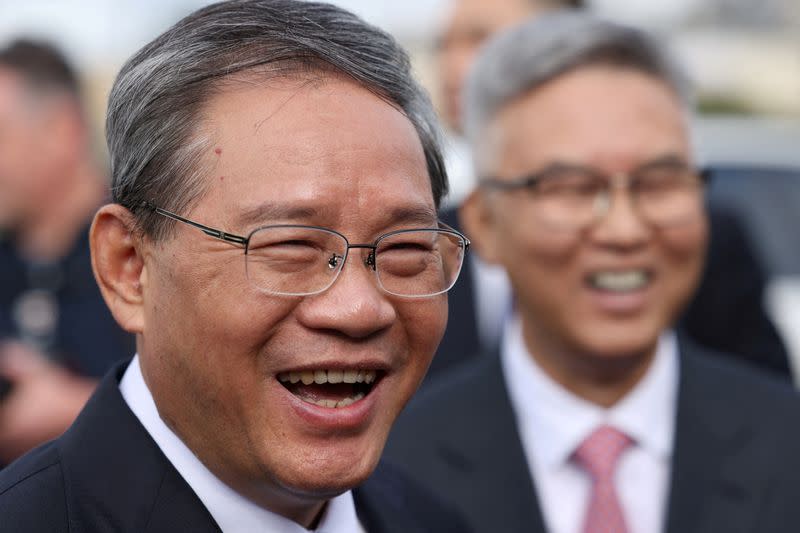China hits back at West's over-capacity allegations in EVs, lithium batteries

By Ellen Zhang and Joe Cash
DALIAN, China (Reuters) -China's Premier Li Qiang used his address at a World Economic Forum meeting in Dalian to hit back at accusations from the U.S. and EU that Chinese firms benefit from unfair subsidies and are poised to flood their markets with cheap green technologies.
Li's comments come as China and the European Union prepare to host technical talks on the planned imposition of tariffs on Chinese-made electric vehicles (EVs) imported into the 27-strong bloc and after the United States unveiled steep tariff hikes on an array of Chinese imports, including EV batteries, in May.
"China's production of advanced electric vehicles, lithium-ion batteries and photovoltaic products, etcetera, first met our domestic demand, but also enrich global supply," Li said in opening remarks in the northeastern Chinese city on Tuesday.
"The rapid rise of China's new industries is rooted in our own unique comparative advantages," Li added.
Brussels' trade policy has turned increasingly protective and aligned with that of Washington over concerns China's production-focused development model could see it flooded with cheap goods as Chinese firms look to step up exports amid weak domestic demand.
Beijing has warned Brussels it risks opening up a new front in the West's trade war with Beijing - which began with Washington's initial import tariffs in 2018 - and opened an anti-dumping probe into EU pork imports following the EU's tariff decision.
"The continuous emergence of economies of scale can effectively dilute enterprises' innovation costs... which is the real source of the strong competitiveness of China's new industries," Li said.
China maintains it simply decided to invest in green technologies earlier, and that the West's actions are unjustified.
"China's really made headway into producing these cars at low cost... so it is a lesson for us to try to get our act together and be better at it," said Benoit Boulet, professor of electrical and computer engineering at McGill University, on the summit's sidelines.
"It's seen as a threat at the very beginning, but then eventually Chinese cars will come to North America."
China and Chinese analysts have consistently rejected accusations it has an over-capacity problem or that its firms benefit from unfair subsidies, asserting that as the $18.6 trillion economy recovers, supply will better meet demand.
Li told delegates "the rapid growth of new industries and new driving forces has strongly supported and sustained the healthy development of China's economy."
"Since the beginning of this year, China's economy has maintained an upward trend... and is expected to continue to improve steadily over the second quarter," Li said.
"We are confident and capable of achieving the full-year economic growth target of around 5%," he added.
(Reporting by Ellen Zhang and Joe Cash; Writing by Joe Cash; Editing by Jacqueline Wong and Raju Gopalakrishnan)

 Yahoo News
Yahoo News 
